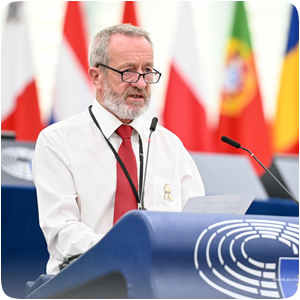 The path to achieving climate neutrality by 2050 requires addressing the energy efficiency of Europe's diverse building stock. It is evident that without significant improvements in this sector, our overarching goal will not be reached. The recent energy crisis has exposed Europe's vulnerability to sudden price hikes, and it is clear that gas prices will remain high even after the crisis subsides.
The path to achieving climate neutrality by 2050 requires addressing the energy efficiency of Europe's diverse building stock. It is evident that without significant improvements in this sector, our overarching goal will not be reached. The recent energy crisis has exposed Europe's vulnerability to sudden price hikes, and it is clear that gas prices will remain high even after the crisis subsides.
This "new normal" will disproportionately affect those living in poorly performing buildings, placing a heavier burden on them compared to those in energyefficient structures. As other sectors modernize, households will bear the brunt of soaring energy prices.
The solution is clear: we must renovate our buildings to consume less energy and rely on cheaper and greener renewable sources. Simply scaling up renewable energy resources alone will not be sufficient to meet our climate goals by 2030 and 2050. We must prioritize increased renovations and structural measures in the building sector. Neglecting the benefits of renovations would only shift the burden of reform to other sectors.
At the core of our efforts lies the Energy Performance of Buildings Directive (EPBD), the EU's primary legal instrument to address energy use in the built environment. While this is EU legislation, its implementation ultimately rests with local authorities and municipalities in most respects. However, it is crucial to recognize the role of the EPBD in setting minimum performance standards for buildings.
In my view, a neighbourhood approach is essential in our pursuit of energy efficiency. By considering entire neighbourhoods and taking into account local mobility, social infrastructures, and water and wastewater management, we can enhance the effectiveness of renovations.
From the historical perspective, most institutional housing providers own residential units that are geographically clustered, i.e. neighbourhoods. Yet, a neighbourhood is more than the sum of its buildings, public and green spaces, amenities, mobility and public transport, social and commercial services are all included.
Looking at scale rather than just individual building level offers additional ways to reach ecological, climate, energy usage and social goals in the building sector. These ways are not available with a perspective that is limited to single buildings or apartments.
The Energy Performance of Buildings Directive should embrace this neighbourhood approach to strike a balance between individual building approaches, as detailed in the European Parliament's Report, and national trajectories for progressive renovations in the Council's General Approach.
Although some versions of the Parliament's position at one point included a neighbourhood approach to minimum standards, derogations of certain portions of the building stock were ultimately chosen. However, the practical benefits of a neighbourhood approach are clear. Through integrated planning and subsidy schemes for technologies such as solar installations, heat pumps, and energy storage, we can increase energy savings and demandside flexibility while actively involving people in the energy transition.
A neighbourhood approach to renovations offers numerous advantages, including costeffectiveness, improved air quality, and the potential for sector coupling, encompassing energy, heat, mobility, and waste management.
If done at scale, there will be reduced costs for maintenance, tenant participation is less fragmented and therefore easier to organise, the renovations themselves become more cost efficient. In essence, most advantages would result from reduced proximity and homogeneity of buildings.
Given the variations in clean heating alternatives across the EU and even within the same municipality, area-specific solutions through a neighbourhood approach prove more efficient, both technically and economically.
Although neighbourhood pilot projects are currently limited, there is significant potential to scale them up across cities, nations, and the entire EU. To expedite the heat transition process, we must address barriers such as labour shortages and citizens' willingness to invest in alternative technologies. Close collaboration between the national government, industry, and educational institutions is crucial to developing mechanisms for monitoring the installation times of sustainable alternatives.
Municipalities play a pivotal role in driving the heat transition forward. With their valuable local knowledge of building stock, heating sources, stakeholders, and residents, they can better anticipate local skill needs, facilitate job-skill matching, and support small- and medium-sized enterprises in streamlining their workforce.
Moreover, municipalities are well positioned to consider the social aspect of the transition in their energy strategies. By developing locally tailored solutions and outlining alternatives to fossil fuels on a neighbourhood-by-neighbourhood basis, they can actively engage residents and promote behavioural change.
Neighbourhood-level communication has proven effective in leveraging social influence and sharing success stories related to district heating, heat pumps, and insulation, thereby maximizing the impact of these measures.
In my view, Member States should be required to set up a minimum amount of pilot neighbourhood projects. Ideally, this would be in every city, but municipality administrative capacity should be factored in. This will help create a positive narrative that could spread through the population, raising awareness and knowledge of environmental problems as well as the benefits of increased energy performance. If implemented probably, this would increase demand for renovations and complement supply sided instruments.
Embracing a neighbourhood approach to building renovations is not only a practical and economic means for achieving climate goals but also for creating a sustainable future.
By prioritizing energy efficiency and integrating renewable technologies, we can reduce carbon emissions.